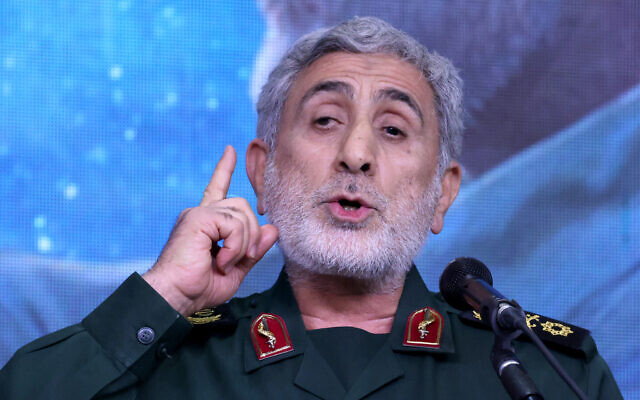Gen. Esmail Qa’ani, head of the Iran Revolutionary Guards’ Qods Forces, speaks at a ceremony in Tehran, January 3, 2024
US Kills Iran-Backed Iraqi Militia Commander
Iran has told militias in Iraq to suspend attacks on US personnel, amid American retaliation for the killing of three US troops in Jordan on January 28, say “multiple Iranian and Iraqi sources”.
The commander of Iran’s Quds Force, the Revolutionary Guards branch for operations outside the Islamic Republic, met representatives of several militia on January 29.
Gen. Esmail Qa’ani warned the militias of an intense US response. He advised the group to take cover, avoiding US strikes on senior commanders and key infrastructure or even a direct strike on Iran.
The sources — three Iranian officials, a senior Iraqi security official, three Iraqi Shi’ite politicians, four sources in Iran-backed Iraqi armed groups, and four Iraq-focused diplomats — say all but one faction initially agreed to Qaani’s request. The next day Kata’ib Hezbollah, blamed by the US for a series of attacks, announced it was suspending the rocket and drone strikes.
After more than 160 assaults since October 7 — the date of Hamas’ mass killing inside Israel, to be followed by Israeli mass killings in Gaza — the Iran-backed factions have not attacked since February 4.
An Iraqi militia commander said, “Without Qa’ani’s direct intervention, it would have been impossible to convince Kata’ib Hezbollah to halt its military operations to de-escalate the tension.”
The sources said Iran’s leadership was concerned about a repetition of the January 2020 US drone strike that killed Quds Force commander Gen. Qassem Soleimani and Kata’ib Hezbollah leader Abu Mahdi al-Muhandis on a road near Baghdad Inernational Airport.
“The Iranians learned their lesson from the liquidation of Soleimani and did not want this to be repeated,” said a “senior Iraqi security source”.
Qa’ani’s visit was quick and he did not leave the airport “for strict security reasons and fearing for his safety,” said the senior Iraqi security source.
Only the Nujaba faction rejected Qa’ani’s call for suspension. However, after the US killed Kata’ib Hezbollah leader Abu Baqir al-Saadi — also a member of the Iraqi State’s Popular Mobilization Forces — on February 7, an umbrella group of the hardline factions vowed to resume operations.
At a funeral service for al-Saadi, senior Kata’ib Hezbollah official and PMF military chief Abdul Aziz al-Mohammedawi stopped short of pledging strikes while declaring, “Revenge for the martyr Abu Baqir al-Saadi means the exit of all foreign forces from Iraq. We won’t accept anything less than that.”


With the Reform Front choosing not to participate, the centrist “Voice of the Nation” has emerged as the hope for moderates and reformists. It has the backing of four political parties (Moderation and Development; Call of Iran; Executives of Construction and National Trust). Other reformist parties are supporting members who have been approved independently: https://www.khabaronline.ir/news/1876287
Principlists are hopelessly divided going into this election with the Coalition Council still unable to form an agreement with the Stability Front and announce a list.
4 reformist/moderate parties preparing list for all of Iran:https://farsnews.ir/amirtayebii/1708603568189208611
The Reform Front has said it will not propose a list for Tehran but has discretely okayed efforts by some reformists to propose a list for other constituencies.
“… but has discretely okayed efforts by some reformists to propose a list for other constituencies….”
So, a certain people, we don’t know who, will introduce certain candidates in a certain regions to be voted for, and we don’t know where that would be. Somehow, this will be all a transparent election
khak barsar oon goosalehai ke harfe to ro bavar mikonan. (shame on those fools who believe your bullshit)
We know reformists and moderates like Pezeshkian, Yousefnejad, Nobakht and Donyamali are running. It is the lesser known candidates we are uncertain about.
Iran’s Reformist Camp In Disarray Over Sham Elections
https://www.iranintl.com/en/202402204964
Jailed Iranian Activists Punished for Announcing Election Boycott
https://iranwire.com/en/news/125534-jailed-iranian-activists-punished-for-announcing-election-boycott/
Khamenei: Those who do not even accept the system should come and vote: https://www.isna.ir/news/1402113021555
“I have said and I will say again that those who do not even accept the system should come to participate in the elections and vote, but not that those who do not accept the system should not be elected to the Majlis….Elections in our country are not a show. The basis of our system is this election. One of these bases is elections. Religious democracy cannot be done with words; Religious democracy takes place with the participation of the people and the presence of the people.”
This speech is to convince those who want to boycott the election to make a protest at the system itself rather than to choose the best person to represent them.
Ali Akbar Rafipour enters elections with his “Morning of Iran” front: https://www.irna.ir/news/85392699
Rafipour is a social media celebrity who combines fundamentalism with secular nationalism in equal measure.
Another “principlist” list is “Progress, Welfare and Justice”: https://www.mehrnews.com/news
Meanwhile, “Voice of the Nation” is having problems reaching a final consensus of who will appear on its list for Tehran as there are more willing candidates than places: https://www.irna.ir/news/85393073
Dissenting Clerics And Politicians Question Iran’s Elections
https://www.iranintl.com/en/202402194588
In farsi
https://twitter.com/Rasoulba1/status/1758002255578452400?s=20
This pause is only because of Iran’s elections and New Year festivities. Things will resume in a matter of weeks.
Meanwhile, a record 15,200 candidates have been approved to run for the Majlis (about 75%): https://www.isna.ir/news/1402113021811
More than 61 million Iranians are eligible to vote: https://www.irna.ir/news/85392039